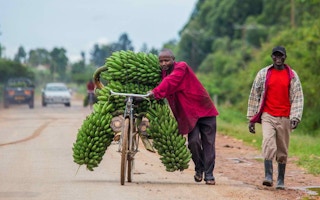Climate change could soon begin to make dramatic impacts on Africa’s agriculture. Up to 60 per cent of land now used to grow beans could become unviable by the end of the century – and in some places, farmers will need to change their ways within the next 10 years.
Two other staple crops face smaller but still significant impacts, with up to one third of the land now used for maize and bananas no longer viable, say scientists in a new study in Nature Climate Change.
“This study tells where, and crucially when, interventions need to be made to stop climate change destroying vital food supplies in Africa,” said Julian Ramirez-Villegas, who works on climate, agriculture and food security at the University of Leeds in the UK.
“We know what needs to be done, and for the first time, we have deadlines for taking action.”
Although climate change has recently delivered higher levels of rainfall to the drought-prone Sahel region, climate projections indicate that extremes of heat, drought and sometimes flood could put food security in Africa in jeopardy.
But ministries of agriculture, communities and village farmers need detailed projections to help them plan for the future. The researchers looked at the timing and pattern of geography governing the nine key crops that provide half of all the harvests in sub-Saharan Africa, and then used a suite of climate simulations to see what is likely to happen as carbon dioxide levels in the atmosphere rise, the whole planet warms and regional climates begin to change.
Growers in Togo, Ghana and Benin in West Africa may have to start changing the way they grow bananas by 2025. The maize growers of Namibia, Botswana, Zimbabwe and Mozambique will also need to start transforming their approach in the next decade.
Right now, farmers in Uganda and Tanzania provide more than 40% of sub-Saharan Africa’s beans on 1.85 million hectares of land. They will not be able to do so by 2100, the study warns. Other regions could be hit even earlier.
But farmers who rely on millet, sorghum, cassava, groundnut and yams will probably be able to go on doing so. The purpose of the study is to identify crops and landscapes that would benefit from irrigation or new farming techniques, varieties with better resistance to heat and drought, a switch to new crops, or a switch from agriculture to pasture.
Many variants
“It can take decades to adjust national agricultural development and food security policies,” said Andy Jarvis, who heads the Leeds research on climate-smart agricultural policies, and one of the co-authors. “Our findings show that time is running out to transform African agriculture.”
Adaptation strategies will vary according to region, tradition, climate and soil. But such research has already begun to transform lives in Africa.
Ugandan farmers who intercrop bananas and coffee have raised incomes by 50 per cent, and become more resilient to climate change. Drought-tolerant maize has raised yields for more than 30 million people in 13 countries. And what happens in Africa can affect other continents.
“Banana imports from sub-Saharan Africa to the UK have more than doubled since 2001, showing that this issue has implications well beyond Africa’s borders,” said Andy Challinor, also of the Leeds team. “The places in which crops are grown will need to alter as climate changes. The key is to plan for those changes.”










